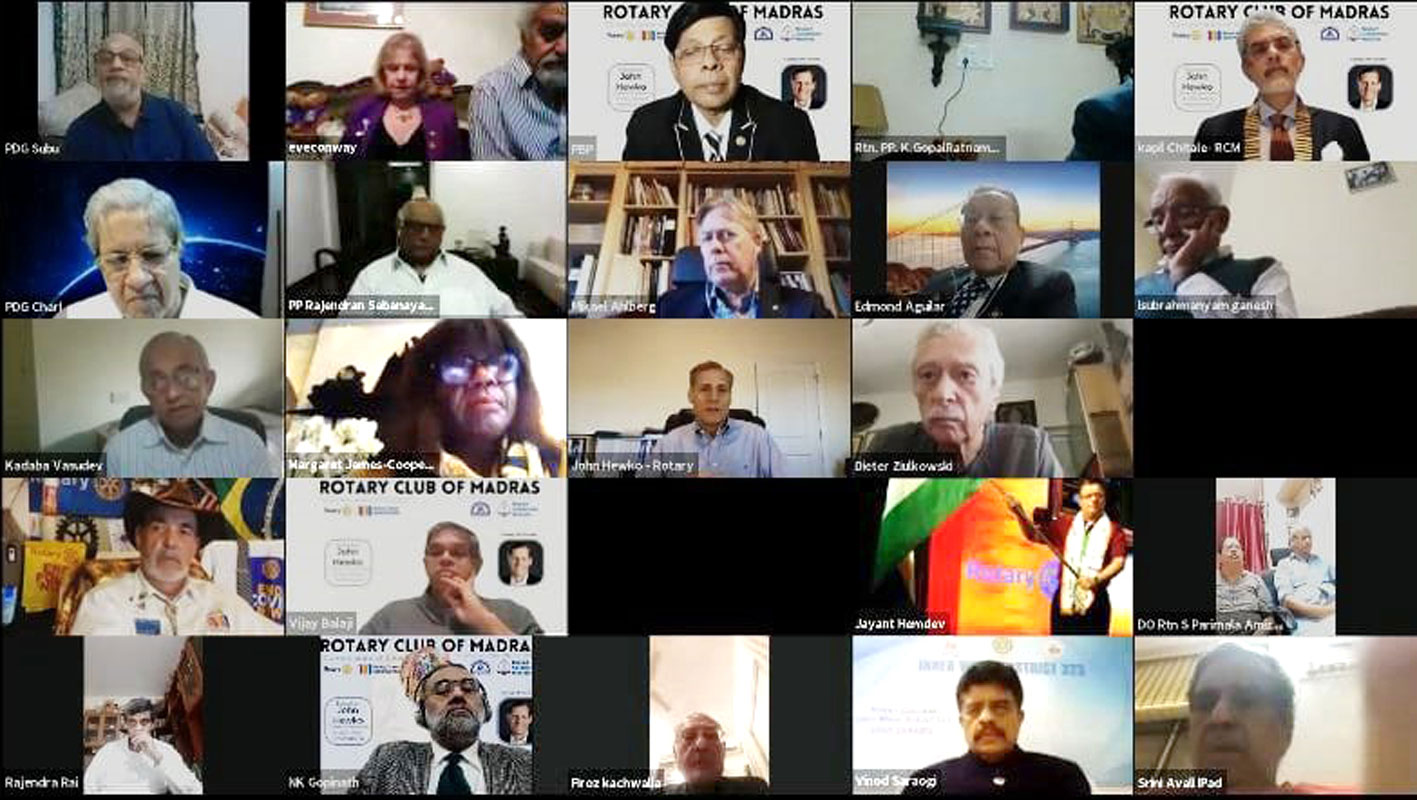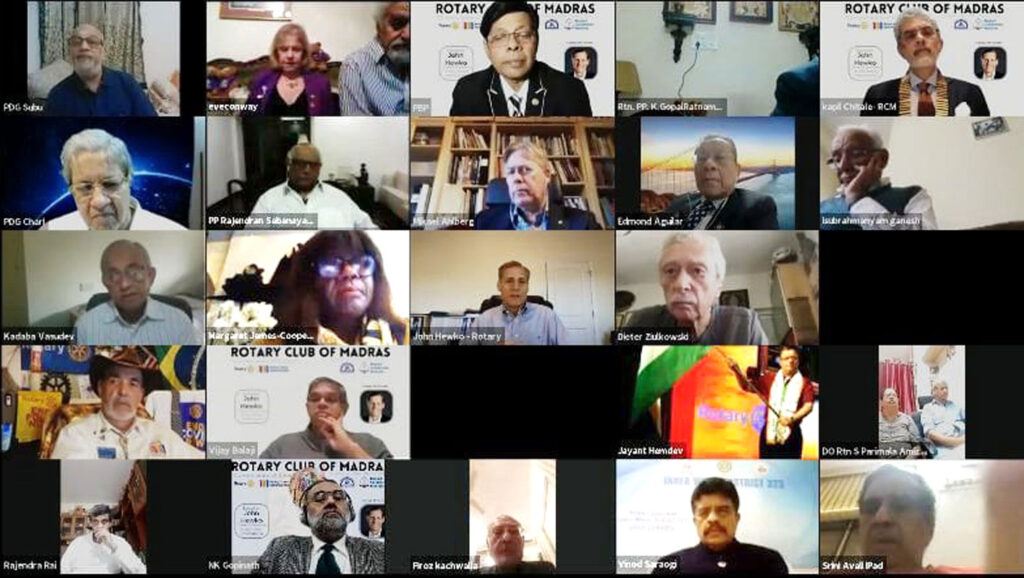Amid the corona gloom and dark predictions for the world, “I can see a few silver linings that Rotary has shown to rest of the world. Rotary’s global operations are in good shape and our financials are strong. Our 1.2 million Rotarians have adopted virtual technologies and are experimenting with new means of doing service projects, fundraisers and fellowship events. We need to recalibrate, step back and think out-of-the-box to provide innovative club experience to new members to sustain growth,” said RI general secretary John Hewko. He was addressing a webinar hosted by RC Madras, RID 3232, on the current state of Rotary in the world.

But he was quick to flag off six issues of concern or challenges which need to be addressed urgently before it is too late. “We need to bring Rotaractors close to Rotary as they are our future assets. But the reality is that 95 per cent of Rotaractors never become Rotarians. Secondly, in membership retention, we observe that those who are 2–3 years in Rotary, are most likely to quit. While the growth is robust in India, Korea, Taiwan, Africa and Eastern Europe, there is a steep membership decline in the US, Canada, Australia and UK where the average age of Rotarians is also going up steadily,” he said. Thirdly, Rotarians need to unleash their creativity in doing community projects in a virtual environment in a post-corona world.
Fundraisers need to be organised in unique ways through virtual platforms and it is here that Rotaractors can chip in with their ideas.
When the going gets tougher, Hewko said, “fundraisers need to be organised in unique ways through virtual platforms” and it is here that Rotaractors can chip in with their ideas. Due to current situation, weak clubs may find it difficult to survive and hence strong, robust clubs must help them out with technology and advisory services, he said. Finally, “the world needs Rotary more than ever. This is our Rotary moment as Covid will open up new opportunities for us.”
Global overview
Between January and March, “I was invited to many workshops and seminars on the pandemic and I came out with a strong feeling that the world is not ready to deal with this crisis and tackle the challenges.” Soon after attending the Davos forum, he realised the Covid crisis is not going to end soon and “I set up the pandemic response task force to make us ready for the new normal through a seamless transition of our operating systems to a new virtual environment.”
He told the RI staff — 575 at the RI headquarters, Evanston, and 200 in EU and Delhi — to get ready the systems for virtual work. RI also has its IT and back office work being done at Pune, Sydney, Tokyo and Brazil, he added.

Rotary had the largest drop of five per cent in membership just three years after the Great Depression of 1930s. But in the great tragedies from the Spanish flu (1918) to World Wars and the financial crises in global economies, the membership loss varied in a bandwidth of only 1–2 per cent. “Just a one per cent membership decline will cause annual loss of $800,000 to Rotary and a five per cent negative growth $4 million loss a year,” he said. But Rotary is on sound financial footing which will enable it to weather the Covid storm, he assured.
So far, the Foundation has disbursed $30 million to Rotary clubs through global grants, DDFs and disaster response fund for executing Covid-related projects and activities across the world. He noted that the polio infrastructure is being used for Covid surveillance and contact tracing in most affected countries. The polio vaccination in Pakistan and Afghanistan (the two had reported 125 cases this year) had resumed after a brief suspension, with the health workers taking adequate Covid precautions.
Legacy projects
RC Madras president Kapil S Chitale recalled the Red Measles eradication programme the club had pioneered jointly with RC Whitby, RID 7070, Canada in 1979. “The success of this project led us to the beginning of the polio eradication programme in 1985 and the then RI President MAT Caparas
approved a grant of $2.6 million to India’s PolioPlus campaign in 1987.” Since 1944, the club is providing a range of vocational training in computer education, tailoring and other skilled jobs for children and women at Rotary Nagar, an urban slum adopted by the club.
The 93-year-old club has built 1,500 toilets in rural areas over the last five years. “A technical training centre will be opened at the 35-acre Boy’s Town Society which has 200 students enjoying free boarding, lodging and schooling with medical facilities,” said Chitale. The centre is built under a GG project worth $268,000. Over the years, the club has given over $2 million to TRF with one AKS donor (PDG J B Kamdar and Marlene) and 40 major donors. It has sponsored 21 Rotary clubs, 26 Interact clubs and 10 Rotaract clubs.
Past presidents A K Gopinath, K Gopal Ratnam, club secretary P B Prasad and PDG Kamdar spoke on the occasion. Around 275 Rotarians and 200 Rotaractors from 17 countries including the US, UK, Canada, Sweden, Austria, Philippines, Malaysia, Egypt, Nigeria, Israel, Pakistan and Bangladesh took part in the virtual meet.
DG S Muthupalaniappan, DGE J Sridhar, PRIDs P T Prabhakar, Mikael Ahlberg (Sweden), PDGs Krishnan V Chari, ISAK Nazar, Babu Peram, Manjit Sawhney, Rajendra Rai, Chandra Bob, S Krishnawamy, P T Ramkumar, Olivannan, A Subramaniam and A P Kanna participated.






